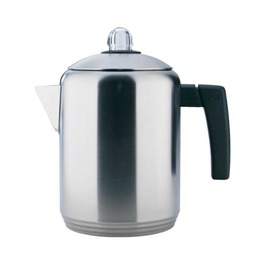Doubt Percolator
Jude 1:22
And on some have mercy, who are in doubt
Most of the time in the Bible, doubt is not a good condition when its reference is to God and His work. It is good to be doubtful about the schemes of man, yet when we treat God as a mere man where doubt is the default, then we are in some dangerous terrain. Often such doubt arises from wickedness, not genuine wonder.
However, is there a place for doubt in our faith that can be at least understandable? Rather than process it as rebellion, it is possible that doubt can be ultimately a good process. Like the grounds in a coffee percolator, the heat of adversity, draws out of our being internal questions that remain latent in our souls until provoked by troubles and circumstances. The grounds of our faith do not mature unless provoked. Doubts not expressed erode faith from within.
This percolator analogy to doubt being like coffee brewing comes from the band The Lost Dogs. The other night, Terry Taylor--the elder canine in The Lost Dogs--explained at a concert here in Lancaster that when the Lost Dogs went to record the song "No Room for Doubt" another of the original four Lost Dogs Gene Eugene (R.I.P.), had a coffee percolator brewing in his Green Room recording studio. Unwittingly, the percolation became part of the soundscape. You can hear it at the beginning of the song in particular. It was one of those providential mistakes, and they could have engineered the gurgling out of the song. They kept it in.
I am not sure that The Lost Dogs make the same broad connection between doubt and percolation consciously, but I don't think it is a stretch at all. Perhaps they do, I just don't want to go beyond what Taylor said. God sends us parables all of the time if we have eyes to see and ears to hear. Most of the time we zoom right by them. If we slow down and consider, the lessons are there to be had. My take from what Taylor said is that the sound just fit acoustically, yet I believe that there is more to it than just that. That they would write and perform a song like this is a testimony of their artistic integrity.
Rather than nail people who express doubts genuinely, why not take the time to draw the doubt out into the cup of consideration where it can be sipped and contemplated rather than thrown back in the doubters face or dismissed and poured down the sink?
And on some have mercy, who are in doubt
Most of the time in the Bible, doubt is not a good condition when its reference is to God and His work. It is good to be doubtful about the schemes of man, yet when we treat God as a mere man where doubt is the default, then we are in some dangerous terrain. Often such doubt arises from wickedness, not genuine wonder.
However, is there a place for doubt in our faith that can be at least understandable? Rather than process it as rebellion, it is possible that doubt can be ultimately a good process. Like the grounds in a coffee percolator, the heat of adversity, draws out of our being internal questions that remain latent in our souls until provoked by troubles and circumstances. The grounds of our faith do not mature unless provoked. Doubts not expressed erode faith from within.
This percolator analogy to doubt being like coffee brewing comes from the band The Lost Dogs. The other night, Terry Taylor--the elder canine in The Lost Dogs--explained at a concert here in Lancaster that when the Lost Dogs went to record the song "No Room for Doubt" another of the original four Lost Dogs Gene Eugene (R.I.P.), had a coffee percolator brewing in his Green Room recording studio. Unwittingly, the percolation became part of the soundscape. You can hear it at the beginning of the song in particular. It was one of those providential mistakes, and they could have engineered the gurgling out of the song. They kept it in.
I am not sure that The Lost Dogs make the same broad connection between doubt and percolation consciously, but I don't think it is a stretch at all. Perhaps they do, I just don't want to go beyond what Taylor said. God sends us parables all of the time if we have eyes to see and ears to hear. Most of the time we zoom right by them. If we slow down and consider, the lessons are there to be had. My take from what Taylor said is that the sound just fit acoustically, yet I believe that there is more to it than just that. That they would write and perform a song like this is a testimony of their artistic integrity.
Rather than nail people who express doubts genuinely, why not take the time to draw the doubt out into the cup of consideration where it can be sipped and contemplated rather than thrown back in the doubters face or dismissed and poured down the sink?



Comments